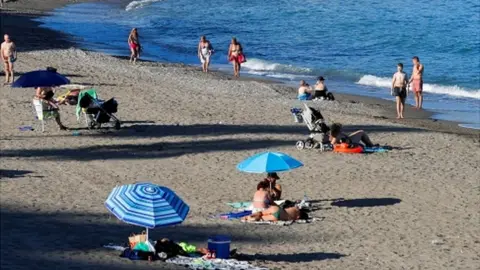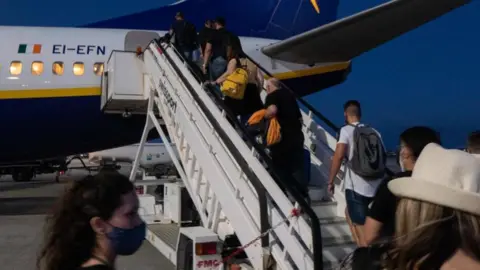Spain, Malta and Portugal restrict non-vaccinated travellers
 Reuters
ReutersPortugal and Malta have introduced measures to restrict UK travellers who are not fully vaccinated.
The Portuguese government says travellers will have to quarantine for 14 days unless they can prove they received their second vaccine dose a fortnight before arrival.
Malta is also only allowing double-vaccinated people in from Wednesday.
In Spain, UK travellers need to prove they are fully vaccinated, or provide a negative PCR test on arrival.
Hong Kong is to ban all passenger flights from the UK from 1 July, after the government said it had discovered cases of "variant virus strains" had been "persistently" detected from the UK in the past few days.
The measures have been introduced for UK travellers, in particular for those not fully vaccinated, amid fears they could spread the Delta variant of coronavirus, which was first established in India.
 Getty Images
Getty ImagesThe Portuguese government added the UK to the list of countries from which travellers must quarantine "at home or a place indicated by the health authorities". The rules came into effect at midnight.
The new quarantine measures apply only to those travelling to mainland Portugal, not Madeira.
There were 19 flights listed as departing on Monday from UK airports to Portugal's mainland airports - Lisbon, Faro and Porto.
Brazil, South Africa, India and Nepal were already on Portugal's quarantine list, but the exception for people who are vaccinated against Covid-19 to avoid isolating applies just to the UK.

'We have no choice but to cancel our holiday'
 Sarah Cluskey
Sarah CluskeyFrustrated would-be holidaymaker Sarah Cluskey is one of many people who have been caught out by the ever-changing travel rules.
"Portugal is one of our favourite holiday destinations and when it went on the green list, we decided to book," she told the BBC.
Sarah's husband runs a construction company and has had to work in very difficult circumstances throughout the year, she says.
He has been travelling into London the whole time, apart from the first three weeks of lockdown.
After a stressful year, she, her husband and their two teenage daughters had been looking forward to a break in the sun.
"Myself and my husband have been double vaccinated, so we can still go. However, we have an 18-year-old daughter who has just received her first vaccination and a 13-year-old daughter who hasn't been vaccinated.
"This leaves us in a position where we can go away, but not as a family, and there will be many other people in the same situation, which is very unfair to families.
"This means that we have no choice now but to cancel our holiday."

Spanish Prime Minister Pedro Sanchez said on Monday the measures in Spain for UK travellers would come into effect in 72 hours and included the Balearic Islands as well.
Portugal and mainland Spain are currently on the UK's amber list, meaning those arriving back in the UK must take two tests and quarantine for 10 days.
The Balearic Islands are on the UK's green list, so holidaymakers do not have to quarantine on their return.
Malta has said only "fully-vaccinated travellers" will be allowed to enter the country from the UK, but children under 12 will be permitted if they are accompanied by parents or guardians who have had both doses.
The Maltese government has said those aged between five and 11 must also show evidence of a negative PCR test taken within the previous 72 hours before arrival.

How do you prove you're vaccinated?
The UK government says travellers can use an NHS Covid Pass to prove their vaccination status.
The pass is available in digital or paper format and people can access their own pass two weeks after having a second dose of the vaccine.
You are eligible to get a pass if:
- You have had a full course (two doses) of any Covid-19 approved vaccine
- You were vaccinated in England
- You are aged 16 or over

 Getty Images
Getty ImagesThe tougher restrictions across Europe come after Germany urged the EU to restrict UK travellers.
The Times reported German Chancellor Angela Merkel wants to designate the UK as a "country of concern" because the Delta variant of the coronavirus is so widespread.
The plans will be discussed by senior European and national officials on the EU's integrated political crisis response committee.

The current travel list
The destinations added to the green list from 04:00 BST on 30 June are:
- Europe: The Balearic Islands (which include Ibiza, Menorca, Majorca and Formentera), Malta and Madeira
- Caribbean: Anguilla, Antigua and Barbuda, Barbados, British Virgin Islands, Cayman Islands, Dominica, Grenada, Montserrat and Turks and Caicos Islands
- Other British Overseas Territories: Bermuda, British Antarctic Territory, British Indian Ocean Territory and Pitcairn
Six destinations will also be added to the government's red list on 30 June - the Dominican Republic, Eritrea, Haiti, Mongolia, Tunisia and Uganda.

Mrs Merkel previously told Germany's parliament: "In our country, if you come from Great Britain, you have to go into quarantine - and that's not the case in every European country, and that's what I would like to see."
She is set to meet Prime Minister Boris Johnson at Chequers on Friday.
French President Emmanuel Macron has also talked about his concern at the spread of the variant.
Currently, fully vaccinated UK visitors to France can enter without quarantining.


Travelling abroad isn't just about what is on the UK's green list: other countries also have to let UK travellers in.
In the last few days, more countries have tightened up their restrictions on arrivals from the UK, but each has decided its own approach on a sliding scale of severity.
Some, like Spain, have added the need for a Covid test, while others like Malta require 12-year-olds and over to quarantine if not fully vaccinated. Each country is likely to continue deciding its own individual travel policy, but if many follow Malta's example, this could majorly disrupt family holidays.
Many countries that rely on UK tourists will be loath to increase restrictions that will stop them from travelling and policies could change during the summer as countries vaccinate more of their citizens.
But these changes do show that international travel is still on shaky ground.

What refund rights are there for holidays abroad?
With Covid still widespread in many countries, tourists will have to think carefully about their spending on holidays.
There is always a risk that a green-list country may move to the amber or red list. If this happens, you will need to quarantine after your holiday - something that could be difficult for many people.
Operators do not have to refund you if you are unexpectedly forced to self-isolate on your return.
If the government announces that travel to a particular country is not advised, then airlines and travel companies are likely to cancel any pre-booked flights or holidays there.
In this case, you are entitled to a full refund and you can choose to receive that refund in cash.


Are you planning a holiday this summer? Have your plans now had to change? Email [email protected].
Please include a contact number if you are willing to speak to a BBC journalist. You can also get in touch in the following ways:
- WhatsApp: +44 7756 165803
- Tweet: @BBC_HaveYourSay
- Upload pictures or video
- Please read our terms & conditions and privacy policy
If you are reading this page and can't see the form you will need to visit the mobile version of the BBC website to submit your question or comment or you can email us at [email protected]. Please include your name, age and location with any submission.
